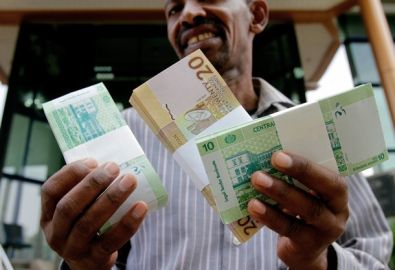Sudanese pound up vs. US dollar on reports of Qatar loan
February 8, 2012 (KHARTOUM) – The Sudanese pound made significant gains against the US dollar in the black market today on optimism that a loan extended by the Arab Gulf state of Qatar will ease the persistent shortage of hard currency that has plagued the economy for more than a year.

On Monday, the Sudanese pound dropped sharply against the US dollar in the unofficial market reaching 5.2 compared to 3.3 in July. The official rate is around 3.
Today the rate dropped to 4.2 – 4.5 pounds per US dollar.
The secession of the oil-rich south last July created what some analysts described as a ‘shock’ as Khartoum lost billions of dollars in oil revenue and in the process the influx of hard currency.
Sudanese officials argue that the government can compensate for the loss with relative ease through expanding gold exploration, bolstering agricultural sector and increasing oil production.
But the Sudanese president Omer Hassan al-Bashir nonetheless admitted that 2012 will be a tough year for the economy before normalising afterwards. He said Khartoum expects aid from friendly nations in the interim.
No details have emerged on the Qatari loan and officials in Doha did not provide any official confirmation.
The Sudanese state minister of finance Magdi Hassan Yassin told Al-Sudani that it is premature to talk about the $2 billion loan until an agreement with Doha is signed.
In a related issue, the Sudanese government imposed new restrictions on those seeking to obtain hard currency to travel abroad to study or seek medical treatment.
Under the new rules, the money will be transferred to the Sudanese embassy in the country of destination which will pay fees directly to the hospital or university/school upon presentation of an invoice.
The Sudanese finance minister Ali Mahmood was quoted by the pro-government Sudanese Media Center (SMC) website as saying that this measure was imposed to prevent abuse by people trying to undeservedly get hard currency.
Banks and Forex bureaus are required to check documentation of Sudanese needing hard currency for travel abroad to prove a legitimate cause.
Yesterday, the pharmacists syndicate in Sudan warned the government that unless it provides 300 million Euros quickly, major pharmaceutical companies will stop selling medicine to pharmacies.
Sudan central bank has a long standing policy of not revealing its foreign exchange reserves but the International Monetary Fund (IMF) projected that by end of 2011 it would cover one month of imports.
(ST)

